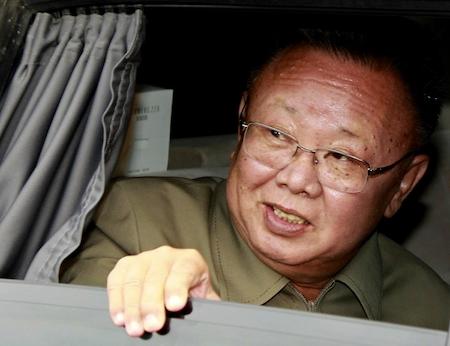Asian markets and the Won decline after Kim Jong Il’s death
North Korea’s leader Kim Jong-Il peers out of a car window after a meeting with Russian officials on August 24, 2011.
The death of Kim Jong Il rattled Asian markets, with the indexes falling as analysts warned his death could cause an uncertain power transition and pausing any discussion aimed at getting North Korea to give up its nuclear weapons, the Associated Press reported.
South Korea’s currency, the won, also depreciated 1.5 percent to 1,174.80 per dollar, falling against all 16 major peers, Bloomberg BusinessWeek reported. This is the weakest the won has been since Oct. 7 and is now close to 1 percent weaker than the dollar. The MSCI Asia Pacific Index fell just 1.7 percent while South Korea’s Kospi index declined 3.4 percent. Selected South Korea’s military-contractor stocks soared, the Wall Street Journal reported.
Read more at GlobalPost: North Korea test fires missile after Kim Jong Il's death
South Korea, also fearful of the effects on its market, released a government statement calling on North Koreans to “loyally follow” Kim Jong Il’s son, Kim Jung Un, Bloomberg reported. Compared to market reaction in European countries due to recent economic problems, market movements in Asia were relatively mild, the WSJ reported.
According to Reuters, these crisis moments in North Korea just cause “blips” in the market, although the death of Kim Jung Il is more significant than most. Japan has canceled its monthly economic meeting and China says it will continue to build its friendship with North Korea to maintain regional stability, Reuters reported.
Read more at GlobalPost: Kim Jong Il's funeral planned as North Korea mourns (VIDEO)
Analysts believe his successor, son Kim Jong Un, will likely focus on consolidating power rather than starting sudden policy changes that would aid North Korea’s battered economy, WSJ reported. The transition to the new leader may also downsize hope of foreign diplomats had of North Korea exchanging economic aid and engagement for a dismantling of its nuclear program.
North Korea’s economy is considered one of the most closed off and repressive in the world, WSJ reported. Very rarely does the country trade with outside nations. North Korea has a centrally planned system that reserves wealth for the military and regime cronies, WSJ reported. Currently, North Korea relies mainly on Chinese and other humanitarian aid to power its economy.
Read more at GlobalPost: China offers "deep condolences" on death of Kim Jong Il
Every day, reporters and producers at The World are hard at work bringing you human-centered news from across the globe. But we can’t do it without you. We need your support to ensure we can continue this work for another year.
Make a gift today, and you’ll help us unlock a matching gift of $67,000!
